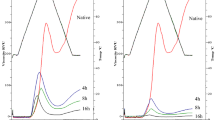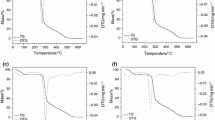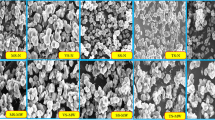Abstract
Maize is the most important source of starch used for industrial applications. Its starch properties can be improved by either single or double modification. Heat–moisture treatment (HMT) and acid modification are known to promote an increase in the levels of slowly digestible starch and resistant starch (RS). In this study, maize starch was treated by conventional HMT (with deionised water) using different organic acids (lactic, citric and acetic). The thermal, structural and pasting properties, morphology and digestibility were evaluated and compared to the native starch. The enthalpy of the native maize starch ranged from 10.30 to 8.78 J g−1 after heat treatment with acetic acid. The starches treated by HMT using lactic and citric acids did not show gelatinisation peaks. The relative crystallinity also decreased after acid–heat treatment, while conventional HMT did not present significant difference in relation to the native starch. The peak viscosity for the native starch was 1,805.5 mPa s. After HMT with acetic and lactic acid, this figure was 969.5 and 41.5 mPa s, respectively. The treated maize starch by HMT with citric acid did not show viscosity peaks in the RVA profile. The morphology of the starches was not strongly affected by acid–heat treatment. HMT increased the RS content; the treatments with lactic and citric acid produced the highest values, with a fivefold increase in relation to the native maize starch (8.45%). The results indicate a possible application for acid–heat treatment starches in functional foods with reduced viscosity.




Similar content being viewed by others
References
USDA. COARSE GRAINS CORN PRICES Selected Export Bids. 2019. Available from: https://apps.fas.usda.gov/psdonline/circulars/grain-corn-coarsegrains.pdf.
Paraginski RT, Vanier NL, Berrios JDJ, de Oliveira M, Elias MC. Physicochemical and pasting properties of maize as affected by storage temperature. J Stored Prod Res. 2014;59:209–14.
Wang W, Zhou H, Yang H, Zhao S, Liu Y, Liu R. Effects of salts on the gelatinization and retrogradation properties of maize starch and waxy maize starch. Food Chem. 2017;214:319–27.
Karaman M, Tuncel NB, Yılmaz Tuncel N. The effect of ultrasound-assisted extraction on yield and properties of some pulse starches. Starch/Staerke. 2017;69:1–9.
Lacerda LG, da Silva Carvalho Filho MA, Bauab T, Demiate IM, Colman TAD, Andrade MMP, et al. The effects of heat-moisture treatment on avocado starch granules. J Therm Anal Calorim. 2014;120:387–93.
Van Hung P, My NTH, Phi NTL. Impact of acid and heat-moisture treatment combination on physicochemical characteristics and resistant starch contents of sweet potato and yam starches. Starch/Staerke. 2014;66:1013–21.
Zaman SA, Sarbini SR. The potential of resistant starch as a prebiotic. Crit Rev Biotechnol. 2016;36:578–84.
Andrade MMP, De Oliveira CS, Colman TAD, Da Costa FJOG, Schnitzler E. Effects of heat-moisture treatment on organic cassava starch: thermal, rheological and structural study. J Therm Anal Calorim. 2014;115:2115–22.
Bet CD, de Oliveira CS, Colman TAD, Marinho MT, Lacerda LG, Ramos AP, et al. Organic amaranth starch: a study of its technological properties after heat-moisture treatment. Food Chem. 2018;264:435–42.
Van Hung P, Vien NL, Lan Phi NT. Resistant starch improvement of rice starches under a combination of acid and heat-moisture treatments. Food Chem. 2016;191:67–73.
Gunaratne A, Hoover R. Effect of heat-moisture treatment on the structure and physicochemical properties of tuber and root starches. Carbohydr Polym. 2002;49:425–37.
Song HY, Lee SY, Choi SJ, Kim KM, Kim JS, Han GJ, et al. Digestibility and physicochemical properties of granular sweet potato starch as affected by annealing. Food Sci Biotechnol. 2014;23:23–31.
Liu H, Liang R, Antoniou J, Liu F, Shoemaker CF, Li Y, et al. The effect of high moisture heat-acid treatment on the structure and digestion property of normal maize starch. Food Chem. 2014;159:222–9.
Ito VC, Bet CD, Wojeicchowski JP, Demiate IM, Spoto MHF, Schnitzler E, et al. Effects of gamma radiation on the thermoanalytical, structural and pasting properties of black rice (Oryza sativa L.) flour. J Therm Anal Calorim. 2018;133:529–37.
Demiate IM, Figueroa AM, Zortéa Guidolin MEB, Rodrigues dos Santos TP, Yangcheng H, Chang F, et al. Physicochemical characterization of starches from dry beans cultivated in Brazil. Food Hydrocoll. 2016;61:812–20.
Sharma M, Yadav DN, Singh AK, Tomar SK. Effect of heat-moisture treatment on resistant starch content as well as heat and shear stability of pearl millet starch. Agric Res. 2015;4:411–9.
Chen Y, Yang Q, Xu X, Qi L, Dong Z, Luo Z, et al. Structural changes of waxy and normal maize starches modified by heat moisture treatment and their relationship with starch digestibility. Carbohydr Polym. 2017;177:232–40.
Shin SI, Lee CJ, Kim DI, Lee HA, Cheong JJ, Chung KM, et al. Formation, characterization, and glucose response in mice to rice starch with low digestibility produced by citric acid treatment. J Cereal Sci. 2007;45:24–33.
Shin SI, Lee CJ, Kim MJ, Choi SJ, Choi HJ, Kim Y, et al. Structural characteristics of low-glycemic response rice starch produced by citric acid treatment. Carbohydr Polym. 2009;78:588–95.
Sin LT, Rahman WAWA, Rahmat AR, Mokhtar M. Determination of thermal stability and activation energy of polyvinyl alcohol-cassava starch blends. Carbohydr Polym. 2011;83:303–5.
Thomaz L, Ito VC, Malucelli LC, da Silva Carvalho Filho MA, Demiate IM, Bet CD, et al. Effects of dual modification on thermal, structural and pasting properties of taro (Colocasia esculenta L.) starch. J Therm Anal Calorim. 2019. https://doi.org/10.1007/s10973-019-08728-1.
Huang TT, Zhou DN, Jin ZY, Xu XM, Chen HQ. Effect of debranching and heat-moisture treatments on structural characteristics and digestibility of sweet potato starch. Food Chem. 2015;187:218–24.
de Siqueira GLDA, da Silveira AC, da Silveira Lazzarotto SR, de Godoy RCB, Schnitzler E, Lazzarotto M. Hydrolysis of the low gelatinization temperature Araucaria angustifolia pine seed starch: thermal, rheological and structural properties. J Therm Anal Calorim. 2019;138:1269–78.
Li M, Xie Y, Chen H, Zhang B. Effects of heat-moisture treatment after citric acid esterification on structural properties and digestibility of wheat starch, A- and B-type starch granules. Food Chem. 2019;272:523–9.
Majzoobi M, Beparva P. Effects of acetic acid and lactic acid on physicochemical characteristics of native and cross-linked wheat starches. Food Chem. 2014;147:312–7.
Lemos PVF, Barbosa LS, Ramos IG, Coelho RE, Druzian JI. The important role of crystallinity and amylose ratio in thermal stability of starches. J Therm Anal Calorim. 2018;131:2555–67.
Xia H, Li Y, Gao Q. Preparation and properties of RS4 citrate sweet potato starch by heat-moisture treatment. Food Hydrocoll. 2016;55:172–8.
Xie H, Gao J, Xiong X, Gao Q. Effect of heat-moisture treatment on the physicochemical properties and in vitro digestibility of the starch-guar complex of maize starch with varying amylose content. Food Hydrocoll. 2018;83:213–21.
Varela MS, Navarro AS, Yamul DK. Effect of hydrocolloids on the properties of wheat/potato starch mixtures. Starch/Staerke. 2016;68:753–61.
Molavi H, Razavi SMA, Farhoosh R. Impact of hydrothermal modifications on the physicochemical, morphology, crystallinity, pasting and thermal properties of acorn starch. Food Chem. 2018;245:385–93.
Juansang J, Puncha-arnon S, Uttapap D, Puttanlek C, Rungsardthong V, Watcharatewinkul Y. Concentration of plasticizers applied during heat–moisture treatment affects properties of the modified canna starch. Food Chem. 2017;221:1587–94.
Chatpapamon C, Wandee Y, Uttapap D, Puttanlek C, Rungsardthong V. Pasting properties of cassava starch modified by heat-moisture treatment under acidic and alkaline pH environments. Carbohydr Polym. 2019;215:338–47.
Xing JJ, Liu Y, Li D, Wang LJ, Adhikari B. Heat-moisture treatment and acid hydrolysis of corn starch in different sequences. Food Sci Technol. 2017;79:11–20.
Klein B, Pinto VZ, Vanier NL, Zavareze EDR, Colussi R, Do Evangelho JA, et al. Effect of single and dual heat-moisture treatments on properties of rice, cassava, and pinhao starches. Carbohydr Polym. 2013;98:1578–84.
Hornung PS, Granza AG, de Oliveira CS, Lazzarotto M, Schnitzler E. Study of the effects of ultraviolet light and sodium hypochlorite solutions on properties of cassava starch granules. Food Biophys. 2015;10:368–74.
Xie Y, Li MN, Chen HQ, Zhang B. Effects of the combination of repeated heat-moisture treatment and compound enzymes hydrolysis on the structural and physicochemical properties of porous wheat starch. Food Chem. 2019;274:351–9.
Pinto VZ, Moomand K, Vanier NL, Colussi R, Villanova FA, Zavareze ER, et al. Molecular structure and granule morphology of native and heat-moisture-treated pinhão starch. Int J Food Sci Technol. 2015;50:282–9.
Chung H, Liu Q, Hoover R. Impact of annealing and heat-moisture treatment on rapidly digestible, slowly digestible and resistant starch levels in native and gelatinized corn, pea and lentil starches. Carbohydr Polym. 2009;75:436–47.
Acknowledgements
The authors are deeply grateful to the Coordination for the Improvement of Personnel in Higher Level (CAPES), for scholarship and C-LABMU-UEPG for the infrastructure. ES, IMD and LGL are research fellows from CNPq.
Author information
Authors and Affiliations
Corresponding author
Additional information
Publisher's Note
Springer Nature remains neutral with regard to jurisdictional claims in published maps and institutional affiliations.
Rights and permissions
About this article
Cite this article
Maior, L.O., de Almeida, V.S., Barretti, B.R.V. et al. Combination of organic acid and heat–moisture treatment: impact on the thermal, structural, pasting properties and digestibility of maize starch. J Therm Anal Calorim 143, 265–273 (2021). https://doi.org/10.1007/s10973-019-09241-1
Received:
Accepted:
Published:
Issue Date:
DOI: https://doi.org/10.1007/s10973-019-09241-1




